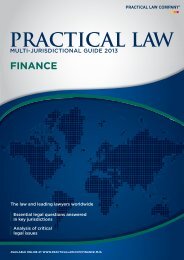WILLS FOR JERSEY RESIDENTS - Carey Olsen
WILLS FOR JERSEY RESIDENTS - Carey Olsen
WILLS FOR JERSEY RESIDENTS - Carey Olsen
You also want an ePaper? Increase the reach of your titles
YUMPU automatically turns print PDFs into web optimized ePapers that Google loves.
<strong>WILLS</strong><br />
<strong>FOR</strong> <strong>JERSEY</strong><br />
<strong>RESIDENTS</strong>
WHAT IS A WILL<br />
A Will is a legal document in which you set out how you would like your estate to be<br />
dealt with after your death. It contains the names of the individuals or institutions<br />
whom you want to receive your assets. Your property and personal possessions are<br />
collectively referred to as your estate.<br />
As Jersey law treats movable and immovable estate differently for succession purposes<br />
we need to consider them separately. Your movable estate includes bank accounts,<br />
jewellery, furniture, cars, life insurance proceeds and shares (including shares in a<br />
property holding company entitling the owner to occupy a share transfer apartment).<br />
Your immovable estate comprises freehold property in Jersey. However, it also<br />
includes commercial premises, farms and fields, contract leases for more than nine<br />
years and flying freehold apartments. Different rules apply to movable and immovable<br />
estates so it is therefore possible and advisable to make separate Wills.<br />
WHY MAKE A WILL<br />
Even if the value of your estate is small, there are several important reasons why you<br />
should make a Will. On a practical level, a Will provides certainty for your family and<br />
friends at a time of emotional distress as it tells them how you wish your estate to be<br />
dealt with. On a legal level, it ensures that your estate is distributed in accordance<br />
with your wishes after your death.<br />
Previously, the term ‘descendants’ under Jersey law excluded illegitimate children of<br />
a man. The law changed on 29th January 2011 giving all legitimate and illegitimate<br />
children equal rights in respect of inheritance. However, this change does not apply<br />
retrospectively. It will only apply (1) in cases where the deceased did not leave a Will<br />
– if the death occurred after the change in the law; or (2) in cases where the deceased<br />
did leave a Will – if the Will was made on or after the change in the law (or if a Codicil<br />
was made on or after this date confirming an earlier Will). Therefore, if there are<br />
illegitimate children in your family you may wish to consider updating your Will if it<br />
was made before the change in the law.<br />
If you die without having made a valid Will, you are said to have died intestate and in<br />
such cases statutory law is applied and your estate will be distributed in accordance<br />
with the terms of the Jersey law of intestacy which may differ from what you want.<br />
It is recommended therefore that you seek legal advice and write a Will to avoid this.<br />
<strong>WILLS</strong> <strong>FOR</strong> <strong>JERSEY</strong> <strong>RESIDENTS</strong> / 3
CAN ANYONE MAKE A WILL<br />
To make a Will a person, known as the testator, must be of full age (18 years old or<br />
over) and of sound mind. However, an exception to this rule is a married minor, who is<br />
able to make a valid Will.<br />
WHAT CAN MY WILL DEAL WITH<br />
Most people want to keep their Will as simple as possible and often give the whole<br />
of their estate (known as the residue) to one or more persons such as a spouse/civil<br />
partner or children. You can also make gifts of specific items such as jewellery or sums<br />
of money in your Will.<br />
You can choose whom you want to be your executor, you can name a guardian to care<br />
for your children and you can give directions for your funeral. The role of executor is<br />
explained in more detail below.<br />
WHAT IF I WANT TO ALTER MY WILL<br />
It is possible to make straightforward changes to a Will by signing a document known<br />
as a Codicil. However, if you require more substantial changes it may be simpler to<br />
prepare a fresh Will. The formalities for executing a Codicil are the same as for a Will<br />
and you should therefore seek legal advice to ensure that everything is done correctly.<br />
“Common law partners receive nothing from the estate<br />
unless they are named beneficiaries.”<br />
4 / <strong>WILLS</strong> <strong>FOR</strong> <strong>JERSEY</strong> <strong>RESIDENTS</strong>
WHAT ARE THE LEGAL REQUIREMENTS<br />
If you own immovable estate you should make two Wills, one covering your<br />
Jersey immovable estate and the other covering all of your other assets. After your<br />
death the Will of Jersey immovable estate is registered in the Public Registry while<br />
your executors obtain a Grant of Probate to your general Will which authorises them<br />
to administer your estate.<br />
Jersey law stipulates certain legal requirements in relation to making a Will and if<br />
these are not complied with, it may mean that the Will is invalid. It is recommended<br />
therefore that you seek legal advice and have a Will drafted professionally by a lawyer.<br />
A Will covering estate other than Jersey immovable property should be signed or<br />
acknowledged by the testator in the presence of two witnesses who are both present<br />
at the same time. These witnesses should not be beneficiaries under the Will or be<br />
close relatives of the testator and should be persons of full age and of sound mind.<br />
A Will of immovable estate must be read out loud to the testator by a Jersey Advocate<br />
(or other suitably qualified witness) in the presence of one other witness who must be<br />
of full age and of sound mind.<br />
HOW MUCH DOES IT COST<br />
The cost of instructing a lawyer to prepare a Will really depends on how complicated<br />
the Will is. We would be happy to provide you with an estimate for drafting your Will.<br />
WHAT IS AN EXECUTOR<br />
An executor is a person, persons or company that is appointed in a Will to carry out<br />
the personal wishes of the testator as expressed in the Will. You can have more than<br />
one executor. Every Will of movable estate should appoint an executor whose duties<br />
will be set out in that Will. An executor obtains probate of the Will and is obliged<br />
to collect in your assets and to distribute them in accordance with the terms of<br />
your Will. Anyone can be appointed as an executor if of full age and of sound mind,<br />
however, it is advisable to check that your intended executor is happy to carry out<br />
the role before appointing them. Your lawyer will generally be prepared to act as your<br />
executor if you wish. There is no executor of a Will of Jersey immovable estate.<br />
<strong>WILLS</strong> <strong>FOR</strong> <strong>JERSEY</strong> <strong>RESIDENTS</strong> / 5
DO I HAVE TO LEAVE MY ASSETS<br />
TO MY FAMILY<br />
No, you do not. However, it is important to be aware that if you make a Will of<br />
movable estate excluding your spouse/civil partner and/or child/children or you choose<br />
to leave them less than their legal entitlement, then a claim can be made against your<br />
executor by the aggrieved spouse/civil partner and/or child/children. This is known as<br />
légitime and the extent of the claim is as follows:<br />
• A spouse/civil partner can claim household effects and two-thirds of the net<br />
movable estate if there are no children.<br />
• If there are children then the spouse/civil partner’s share is restricted to one-third<br />
of the net movable estate and the children can claim another one-third share of the<br />
net movable estate.<br />
• If there is a child or children but no spouse/civil partner, then the child or children<br />
are entitled to claim two-thirds of the net movable estate.<br />
• In each of the above cases the remaining third of the estate passes in accordance<br />
with the terms of the Will.<br />
• If you have neither spouse/civil partner nor descendants, you have full testamentary<br />
freedom to leave your movable estate assets to whomever you wish.<br />
Légitime must be claimed formally through the Royal Court within a year and a day<br />
of the Grant of Representation having being issued. Usually a Will is only subject to<br />
légitime challenges if a degree of acrimony exists, perhaps where there is a family<br />
feud or a second marriage.<br />
6 / <strong>WILLS</strong> <strong>FOR</strong> <strong>JERSEY</strong> <strong>RESIDENTS</strong>
The phrase “household effects” is defined by the Wills and Succession (Jersey) Law<br />
1993 (as amended) and means articles of household or personal use or ornaments<br />
normally located in or around the matrimonial home, but this is subject to some<br />
exceptions such as motor cars; money; items; sets of items over £10,000 and items<br />
used wholly for business purposes.<br />
A person will usually die leaving at least some debts such as outstanding bills or an<br />
income tax liability. The estate is liable for these debts and also for funeral expenses<br />
which are deducted from the assets to calculate the value of the net movable estate<br />
for probate purposes.<br />
The general rule is that by making a Will you can leave your immovable estate to<br />
whoever you choose. However, in respect of your immovable estate, if you are a<br />
married man and make a Will and leave a widow then she is entitled to her dower<br />
right of a life enjoyment of one-third of the immovable property that you own.<br />
This contrasts with a surviving husband’s right to life enjoyment of all of his late<br />
wife’s immovable property provided that there had been a child born of the marriage,<br />
known as his viduité.<br />
Under the Civil Partnership (Jersey) Law 2012 which came into force on the 2nd<br />
April 2012 a surviving civil partner of either sex was given the rights to claim dower<br />
as opposed to viduité.<br />
“Every will of movable estate should appoint<br />
an Executor.”<br />
<strong>WILLS</strong> <strong>FOR</strong> <strong>JERSEY</strong> <strong>RESIDENTS</strong> / 7
WHAT HAPPENS IF I DO NOT<br />
MAKE A WILL<br />
If you die without leaving a Will you are said to be intestate. The following is an<br />
outline of the statutory provisions that will apply in an intestate estate.<br />
In respect of your immovable estate:<br />
• If you leave a spouse/civil partner with no children then your surviving spouse/civil<br />
partner is entitled to inherit all of your immovable estate.<br />
• If you leave a spouse/civil partner and children then your surviving spouse/civil<br />
partner is entitled to life enjoyment of the matrimonial home and your spouse/civil<br />
partner and each of your children share the ownership equally.<br />
• If you leave children but no surviving spouse/civil partner then your children will<br />
share the whole of your immovable estate equally.<br />
In respect of your movable estate:<br />
• If you leave a spouse/civil partner but no children then your surviving spouse/civil<br />
partner is entitled to receive the whole of the movable estate.<br />
• If you leave a spouse/civil partner and children then your surviving spouse/civil<br />
partner is entitled to receive the household effects, the first £30,000 and a half<br />
share of the remainder. Your children receive the remaining half share equally<br />
between them.<br />
• If you leave children but no surviving spouse/civil partner then your children will<br />
receive the whole of your movable estate equally.<br />
DOES SEPARATION OR<br />
DIVORCE MATTER<br />
Yes it does. If you are divorced or have obtain a decree of judicial separation against<br />
your spouse/civil partner or if he or she has deserted you without good cause then the<br />
surviving spouse/civil partner loses their entitlement to your estate unless you make<br />
express provision in your Will to the contrary.<br />
“Your Will of Jersey immovable estate is registered<br />
in the public registry.”<br />
8 / <strong>WILLS</strong> <strong>FOR</strong> <strong>JERSEY</strong> <strong>RESIDENTS</strong>
WHAT HAPPENS TO MY WILL OF <strong>JERSEY</strong><br />
IMMOVABLE ESTATE WHEN I DIE<br />
As soon as your Will of Jersey immovable estate is registered in the Public Registry,<br />
title to your immovable property passes to those persons you have named in your Will<br />
of Jersey immovable estate, who are known as devisees.<br />
If you leave your matrimonial home to your spouse/civil partner or all of your<br />
immovable property to your closest relatives in the way that they would inherit your<br />
estate had you died intestate, then there is no stamp duty payable. Otherwise stamp<br />
duty is payable on registration of the Will on sliding scale of up to 3% of the value of<br />
the property.<br />
“Your lawyer will generally be prepared to act as<br />
your executor.”<br />
WHAT IF MY PARTNER AND I ARE<br />
NOT MARRIED<br />
Jersey law does not recognise common law spouses so they will have no right to your<br />
estate is you die intestate. You can provide for your partner in your Will.<br />
WHAT IS A GRANT OF PROBATE<br />
A Will of movable estate does not take effect until it has been proved in Court and<br />
a Grant of Probate issued. Probate is the order of the Court which confirms that the<br />
Will is valid and confirms the authority of the executor to administer the estate of the<br />
deceased. The executor will be required to swear an oath in Court to confirm that<br />
he will administer the estate both properly and honestly and in accordance with the<br />
terms of the Will.<br />
<strong>WILLS</strong> <strong>FOR</strong> <strong>JERSEY</strong> <strong>RESIDENTS</strong> / 9
CAN I APPOINT GUARDIANS<br />
In the event that your children may be under the age of 18<br />
years at your death, you can state in your Will of movable estate<br />
whom you would like to act as their guardian. Jersey law also<br />
provides for a tutelle to be set up to manage the funds and any<br />
property left to minor children. You can express a wish in your<br />
Will that certain persons be appointed to any tutelle that needs<br />
to be established.<br />
10 / <strong>WILLS</strong> <strong>FOR</strong> <strong>JERSEY</strong> <strong>RESIDENTS</strong>
47 Esplanade<br />
St Helier<br />
Jersey<br />
JE1 0BD<br />
Channel Islands<br />
T +44 (0)1534 888900<br />
F +44 (0)1534 887744<br />
WWW.CAREYOLSEN.COM<br />
BRITISH VIRGIN ISLANDS CAYMAN ISLANDS GUERNSEY <strong>JERSEY</strong><br />
CAPE TOWN LONDON





